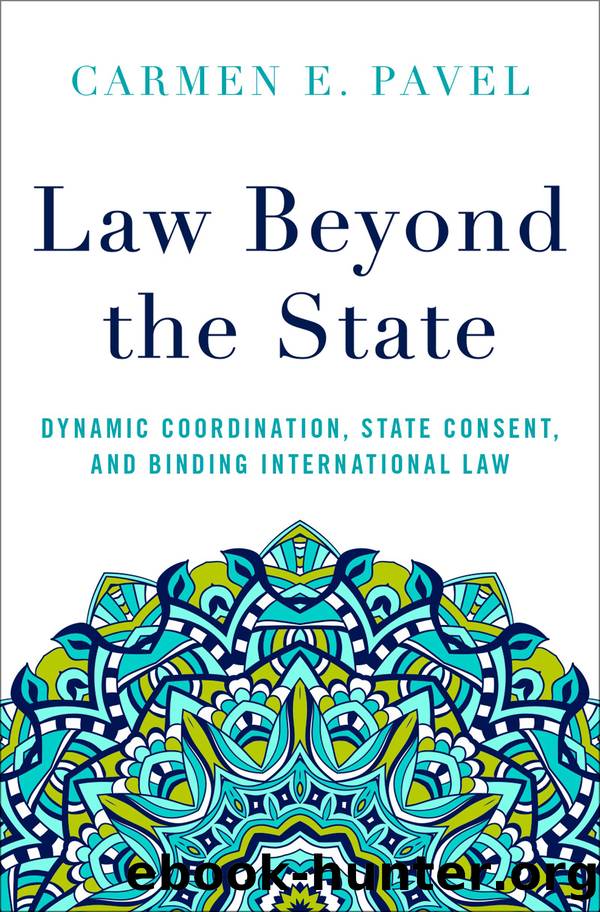Law Beyond the State by Carmen E. Pavel

Author:Carmen E. Pavel
Language: eng
Format: epub
Publisher: Oxford University Press
Published: 2021-06-15T00:00:00+00:00
The Purpose of the International Rule of Law
In the absence of a bureaucratic structure that closely resembles a world government, two questions arise: (1) Which agents have the potential to exercise arbitrary power that must be limited? and (2) Who are the subjects of international law whose autonomy must be protected from arbitrary interference? The answer to the second question is more straightforward. International law is addressed mostly to states, with an increasing but still small role for individuals and other group and corporate agentsâcompanies, indigenous groups, nongovernmental organizations (NGOs)âas direct subjects of international law. An international rule of law would need to protect all of these agents, as well as any other actors that would fall under its remit directly or indirectly through the mediating power of states, from arbitrary power exercised by global governance institutions and international officials in their exercise of their capacities.
The answer to the first question is that all of the agents that make, interpret, and apply international law can potentially exercise arbitrary power that must be limited. These are primarily states, who have the power to make treaties, and the international institutions that states endow with autonomous capacity to apply and enforce the rules, such as the International Court of Justice, the World Trade Organization, various ad hoc tribunals and regional courts and organizations, and the agencies of the United Nations system, including the Security Council. Thus states have a dual agency both as subjects and officials of international law.
The idea that international law should be promulgated and constrained such that it protects state autonomy is very much in dispute. Jeremy Waldron argues that the protection of state autonomy should not be one of the aims of an international rule of law (Waldron 2006, 18). He draws an analogy with domestic law, for which he distinguishes two general subjects, individuals and administration, and argues that only individuals are entitled to the benefit of the rule of law and the protection of their autonomy. The rule of law creates a predictable environment in which individuals exercise their freedom and plan their lives secure in the knowledge that no arbitrary use of state power will undo their plans at will. Administration, by which he means the collection of government bureaucratic bodies, holds no entitlement to the protection of its autonomy from the law in the same way. Whereas less law is better for individual autonomy, no such presumption is warranted with respect to administration. In fact, more law is required to regulate administrative bodies rather than less, because this means that more of their actions are taken in accordance with rules laid out in advance and that their discretion is limited accordingly (Waldron 2006, 18â19).
As officials in charge of making international law, states are in the same position as domestic administration, Waldron claims. Their behavior must be constrained and their discretion limited by more law, not less, and they do not gain the presumption in favor of the protection of their autonomy. States are constituted as
Download
This site does not store any files on its server. We only index and link to content provided by other sites. Please contact the content providers to delete copyright contents if any and email us, we'll remove relevant links or contents immediately.
HPCR Manual on International Law Applicable to Air and Missile Warfare by Program on Humanitarian Policy and Conflict Research at Harvard University(90)
Putting the Tea in Britain by Les Wilson(87)
International Criminal Law in a Nutshell by Stewart David P.;(87)
The Trial of Pierre Laval by J. Kenneth Brody(83)
An Inquiry into the Nature of Peace and the Terms of Its Perpetuation by Thorstein Veblen(83)
Underwater Cultural Heritage and International Law by Sarah Dromgoole(82)
The Limits of International Law by Jack L. Goldsmith & Eric A. Posner(80)
The Medallion by Alan P. Woodruff(73)
Otto, Roland - Targeted Killings and International Law With Special Regard to Human Rights and International Humanitarian Law by Springer (2009)(70)
Transnational Crime and Criminal Justice by Marinella Marmo Nerida Chazal(69)
Uncertain Justice: A Legal Thriller by K. Ryan Kerry(68)
Law Beyond the State by Carmen E. Pavel(66)
Trafficking Justice : How Russian Police Enforce New Laws, from Crime to Courtroom by Lauren A. McCarthy(66)
Rethinking Nordic Courts by Laura Ervo; Pia Letto-Vanamo; Anna Nylund(65)
The Law of Non-International Armed Conflict by Sivakumaran Sandesh;(64)
Disruptive Technology and the Law of Naval Warfare by James Kraska(64)
The Rhetoric of Genocide by Ben Voth(63)
We Want What's Ours by Atuahene Bernadette;(63)
Beyond the Banality of Evil by Augustine Brannigan;(61)
